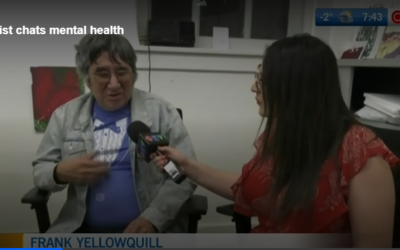For those living with mental illness or a serious medical condition, making art can offer solace and hope when they need it most
Winnipeg Free Press | DECEMBER 2, 2018 | by KELSEY JAMES

MIKAELA MACKENZIE / WINNIPEG FREE PRESS
Brittney Fox, artist in residence, poses for a portrait at Artbeat Studio in Winnipeg on Wednesday, Nov. 28, 2018.
Winnipeg Free Press 2018.
There have been times when Brittney Fox felt like her life was “devoid of colour.”
Fox lives with mental illness. After being hospitalized and experiencing an abusive foster home situation, art helped Fox cope with her mental-health challenges.
Fox is an artist at Artbeat Studio, a non-profit that’s been helping those living with mental-health issues heal through creative expression for the past 14 years. Artists who self-identify as having a mental illness apply by submitting work samples and letters of support.
The organization accepts eight artists at a time. Every six months – after a group show in January and July – new participants are brought in while the previous ones become alumni.
Fox says she has been making art since she was three years old. She applied to Artbeat after her psychiatrist mentioned it to her.
“I was starting to withdraw from society a little,” Fox says. “It definitely put me in the right place at the right time.”

MIKAELA MACKENZIE / WINNIPEG FREE PRESS
Brittney Fox, artist in residence, paints at Artbeat Studio in Winnipeg on Wednesday, Nov. 28, 2018.
Winnipeg Free Press 2018.
 Nigel Bart, studio facilitator and one of Artbeat’s founders, was diagnosed with schizophrenia when he was 19. He says art helps him directly address what he’s feeling.
Nigel Bart, studio facilitator and one of Artbeat’s founders, was diagnosed with schizophrenia when he was 19. He says art helps him directly address what he’s feeling.
“It’s been a way of getting at those issues in a creative way, ” Bart says. “I’ll draw a picture and visualize something positive in my life instead of thinking about the negative. I can find very creative solutions to my problems.”
Bart studied fine arts and dabbled in pottery with his mother, which he found “very healing,” before volunteering in the mental-health field. After meeting creative people with mental illness, Bart and his parents conceived of Artbeat. They presented their idea to stakeholders in 2004 and received funding the following year.
“I thought it would be awesome to have a place where people with mental-health issues could hang out in a collaborative setting,” Bart says. “When you start thinking of yourself as an artist it kind of gives you some hope.”
While Artbeat does not offer counselling in a clinical sense, expressive arts therapies are growing in popularity. Doctors in the United Kingdom, for instance, will soon be able to treat patients with a dose of arts and culture, according to an article published by BBC News.
The campaign — referred to as “social prescribing” — is expected to launch by 2023. The initiative will allow the country’s physicians to prescribe therapeutic art- or hobby-based treatments for health issues ranging from dementia to lung conditions and mental illness.
The Montreal Museum of Fine Arts (MMFA) has a similar campaign. Since Nov. 1, doctors who are members of Médecins francophones du Canada have been able to send patients on free trips to the museum to enjoy the health benefits of art.

MIKAELA MACKENZIE / WINNIPEG FREE PRESS
An unfinished chess set by Brittney Fox at Artbeat Studio in Winnipeg on Wednesday, Nov. 28, 2018.
Winnipeg Free Press 2018.
The one-year pilot project, which will allow physicians to hand out 50 museum “prescriptions” over the course of the initiative, is the first of its kind in the world, according to the MMFA.
Tanis Dick, a private practice art therapist in Winnipeg, has been working in the field for over a decade.
“More and more (we) are starting to acknowledge treating the whole person. Art therapy can do that because it involves the body and the spirit”– Tanis Dick, a private practice art therapist
Many of Dick’s clients are children in the foster care system, some of whom have a diagnosis of fetal alcohol syndrome. She uses a “brain-based view of behaviour” that’s trauma-informed. During sessions, kids may work in autobiographical art, sand play or drama.
“Children can’t benefit from talk therapy in the same way as adults,” Dick says. “Some are less verbal and aren’t comfortable expressing themselves with words. The therapist gets information through what they create.”
Dick believes expressive arts therapies also allows people to reconnect with their true self, which is a “key part of healing.”
“More and more (we) are starting to acknowledge treating the whole person. Art therapy can do that because it involves the body and the spirit,” Dick says.
Expressive arts therapies are not reserved for people living with mental-health issues.
Miriam Duff, a psychosocial oncology clinician at CancerCare Manitoba, runs a weekly Expressive Arts Group for patients, free-of-charge.
The introductory program lasts 10 weeks. After it ends, participants are invited to attend the Art Grad Group for up to two years, or as long as they’re followed by CancerCare.
Duff believes the program is a “safe space” where patients are able to relate to one another.
“A common experience people have shared with me is they have a very fragmented sense of self after the cancer diagnosis and treatment experience,” Duff says. “The expressive arts-based approach gives them a chance to get back in touch with a resilient feature we all have: our imagination.”
Duff believes a patient’s finished product is also a “legacy of what they’ve been through” to share with family and friends.
“It’s not about their cancer, it’s about them living through their cancer,” she says. “There’s the cure, which is the treatment, but healing’s different because it’s about all the different parts of a person: the physical, the emotional, the intellectual and the spiritual.”
Sylvia Hansen joined the group after receiving her breast cancer diagnosis in August 2014. She found out about it while undergoing chemotherapy, and says she thought it would be “something more positive” to do outside of appointments.
“It left me with this real peacefulness,” Hansen says. “As I was going through the treatments, it was something I really looked forward to.”
[hr]




